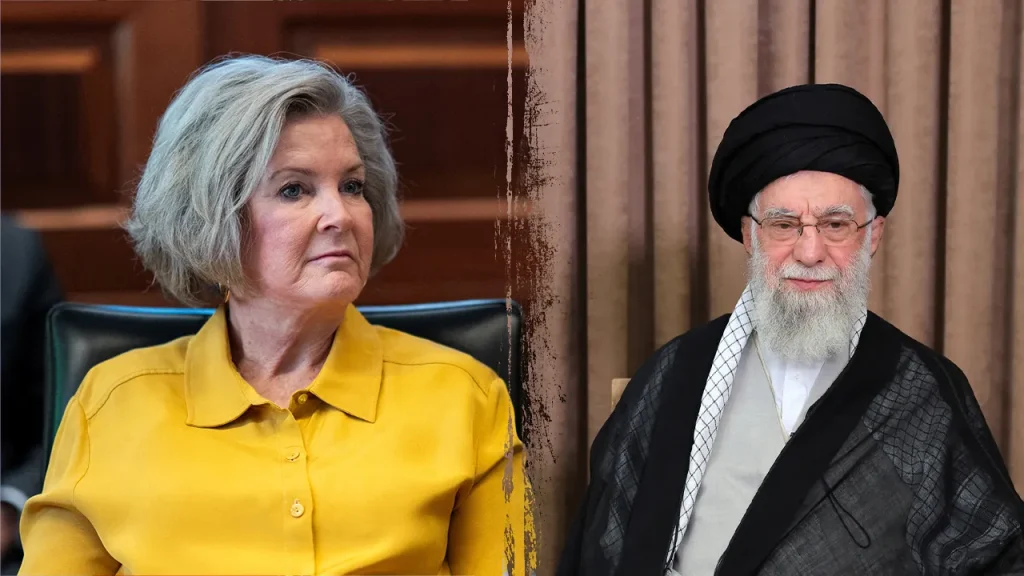An Iranian cyber group known as “Robert” has issued threats to release a significant cache of emails claimed to be obtained from key allies of former President Donald Trump. The email trove reportedly includes communications from White House Chief of Staff Susie Wiles, strategist Roger Stone, and attorney Lindsey Halligan, among others. This cyberattack follows a pattern of cyber operations attributed to Iran, particularly in response to U.S. strikes on Iranian nuclear facilities.
| Article Subheadings |
|---|
| 1) Overview of the Cyber Threat |
| 2) U.S. Government Response and Concerns |
| 3) Historical Context of Cyber Operations |
| 4) Implications for National Security |
| 5) Future Outlook on Cybersecurity |
Overview of the Cyber Threat
The Iranian cyber group operating under the alias “Robert” has announced its intention to release approximately 100 gigabytes of stolen emails from several prominent associates of Donald Trump. The material includes sensitive communications of notable figures, including Susie Wiles, Roger Stone, and Lindsey Halligan. This group has a history of cyber operations tied to geopolitical contexts, especially during times of tension between the U.S. and Iran.
The disclosure of this data raises significant concerns, especially given the sensitive nature of the contents. The hackers have previously released documents that were sent to media outlets during the 2024 election, linking them to broader attempts to destabilize political processes in the U.S.
U.S. Government Response and Concerns
In response to this alarming situation, U.S. officials have emphasized the importance of safeguarding the officials involved. Pam Bondi, the Attorney General, characterized the hack as an “unconscionable cyberattack” and affirmed that government agencies are committed to ensuring the safety of the targeted individuals. The FBI has been proactive in investigating such breaches, asserting that any threats to national security will be met with thorough investigations and potentially serious legal repercussions.
Furthermore, Kash Patel, Director of the FBI, reiterated the agency’s commitment to maintaining secure communications for administration officials. His statement highlights the seriousness with which the government is treating these threats, particularly in a politically charged environment.
The Cyber and Infrastructure Security Agency has also echoed concerns about the group’s motivations. Spokesperson Marci McCarthy described the Iranian threat as a method to “distract, discredit, and divide” public opinion, indicating a strategic aim beyond mere information theft.
Historical Context of Cyber Operations
The current situation is not isolated but forms part of a larger trend of cyber operations attributed to Iranian actors. Last summer, Iranian-linked hackers demonstrated their capability by sending stolen information from Trump campaign members to individuals associated with the Biden campaign and various media outlets. This trend has resulted in indictments from the Biden Justice Department, which accused members of Iran’s Revolutionary Guard Corps of being involved in these breaches.
The recent threats from “Robert” signal a renewed activity following military confrontations, specifically the U.S. strikes on Iranian nuclear sites. These cyber efforts from Iran serve as a non-military countermeasure, indicating an evolution in tactics towards indirect retaliation.
Implications for National Security
The implications of this ongoing cybersecurity threat extend into the realm of national security. Analysts warn that the actions of Iranian hackers present significant vulnerabilities, especially as hackers may exploit weaknesses in both public and private sectors as they seek revenge for perceived aggressions from the U.S. This could include critical infrastructure and other domains essential to national operations.
As the situation develops, U.S. officials have issued warnings suggesting that American companies and infrastructure operators remain at risk. The likelihood of retaliatory cyberattacks coincides with geopolitical tensions, emphasizing the need for proactive defenses.
Future Outlook on Cybersecurity
Looking forward, the threat landscape presents substantial challenges. The continued activity by Iranian-affiliated cyber groups indicates a persistent risk for U.S. interests domestically and abroad. U.S. agencies have cautioned that ongoing negotiations for a permanent resolution in the region may not immediately mitigate these cyber threats.
Experts in cybersecurity suggest that enhancements in data security measures and public awareness are imperative. As these actors remain active in seeking means to exploit vulnerabilities, the emphasis on cooperation between government agencies and private sectors becomes increasingly crucial.
| No. | Key Points |
|---|---|
| 1 | An Iranian cyber group has threatened to release stolen emails from Trump associates. |
| 2 | U.S. officials describe the hack as a serious cyberattack, emphasizing the need for security. |
| 3 | The incident reflects a pattern of Iranian cyber activities aimed at influencing U.S. politics. |
| 4 | Cybersecurity measures are essential as ongoing tensions increase potential vulnerabilities. |
| 5 | Future cyber threats from Iran may affect both public and critical infrastructure in the U.S. |
Summary
The recent threats from an Iranian cyber group highlight the vulnerability of political figures and the potential for significant implications on national security amidst increasing geopolitical tensions. With the U.S. government actively seeking to secure communication channels, the situation underscores the need for robust cybersecurity measures to protect against future attacks. Continuous monitoring and proactive strategies will be pivotal in mitigating risks posed by cyber threats in the unpredictable landscape of international relations.
Frequently Asked Questions
Question: Who is behind the cyberattack?
The cyberattack is attributed to an Iranian-linked group operating under the alias “Robert,” which claims to have obtained emails from key allies of former President Donald Trump.
Question: What actions is the U.S. government taking in response?
U.S. officials, including the Attorney General and FBI Director, have expressed serious concerns and are prioritizing investigations to safeguard the affected officials and strengthen communication security.
Question: What is the significance of these cyber threats?
These threats indicate a pattern of Iranian cyber operations designed to exploit vulnerabilities in U.S. political processes and infrastructure, highlighting the ongoing need for enhanced cybersecurity measures.


